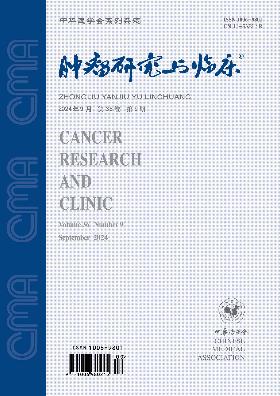Epidermal growth factor receptor tyrosine kinase inhibitor rechallenge after epidermal growth factor receptor tyrosine kinase inhibitor-induced interstitial lung disease: report of one case and review of literature
Q4 Medicine
引用次数: 0
Abstract
目的 探索表皮生长因子受体(EGFR)酪氨酸激酶抑制剂(TKI)致间质性肺炎(ILD)好转后成功再用同类药物的临床可行性。 方法 回顾性分析北京清华长庚医院1例肺腺癌患者应用吉非替尼致ILD治疗好转后成功再用同类药物的临床资料,并进行文献复习。 结果 该例为53岁男性患者,因转移性肺腺癌应用吉非替尼治疗50 d后出现喘憋,结合肺部CT及血气分析结果诊断为EGFR-TKI相关ILD,停用靶向药物并予激素治疗。症状明显改善后再次应用同类药物,肿瘤得到控制且未再发生ILD。 结论 EGFR-TKI致ILD症状好转后,在取得患者知情同意并密切监测的情况下,临床可尝试再用同类药物,可延长患者生存期。表皮生长因子受体酪氨酸激酶抑制剂诱导间质性肺病后再激发表皮生长因子接收器酪氨酸激酶抑制剂:1例报告和文献复习
Objective: To explore the clinical feasibility of successfully reusing similar drugs after the improvement of interstitial pneumonia (ILD) caused by epidermal growth factor receptor (EGFR) tyrosine kinase inhibitor (TKI). Method: A retrospective analysis was conducted on the clinical data of a lung adenocarcinoma patient treated with gefitinib and successfully treated with similar drugs after improvement in ILD at Beijing Tsinghua Changgeng Hospital, and literature review was conducted. The result was a 53 year old male patient who developed wheezing after 50 days of treatment with gefitinib for metastatic lung adenocarcinoma. Combined with lung CT and blood gas analysis, the diagnosis was EGFR-TKI related ILD. Targeted drugs were discontinued and hormone therapy was given. After significant improvement in symptoms, similar drugs were administered again, and the tumor was controlled without any further occurrence of ILD. Conclusion: After the improvement of ILD symptoms caused by EGFR-TKI, with the patient's informed consent and close monitoring, similar drugs can be tried again in clinical practice, which can prolong the patient's survival period.
本文章由计算机程序翻译,如有差异,请以英文原文为准。
求助全文
约1分钟内获得全文
求助全文
来源期刊

肿瘤研究与临床
Medicine-Oncology
CiteScore
0.10
自引率
0.00%
发文量
7737
期刊介绍:
"Cancer Research and Clinic" is a series of magazines of the Chinese Medical Association under the supervision of the National Health Commission and sponsored by the Chinese Medical Association.
It mainly reflects scientific research results and academic trends in the field of malignant tumors. The main columns include monographs, guidelines and consensus, standards and norms, treatises, short treatises, survey reports, reviews, clinical pathology (case) discussions, case reports, etc. The readers are middle- and senior-level medical staff engaged in basic research and clinical work on malignant tumors.
 求助内容:
求助内容: 应助结果提醒方式:
应助结果提醒方式:


